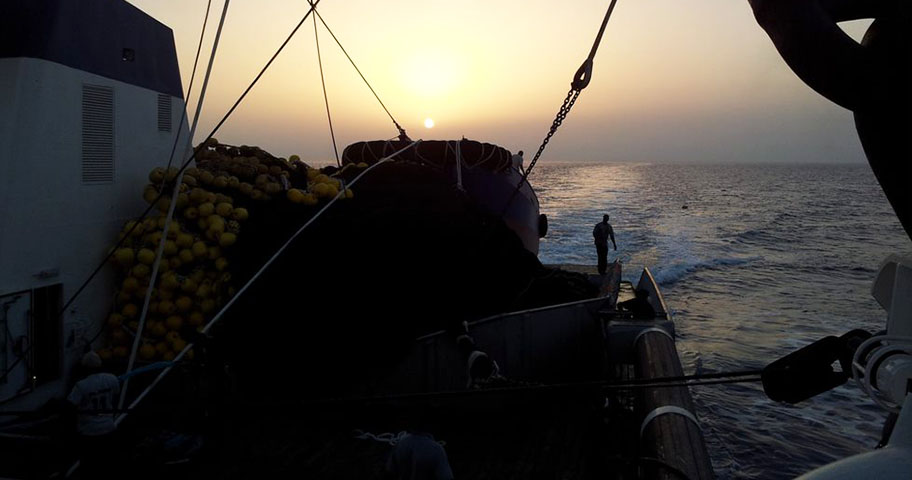Despite this, the sustainable seafood industry is coming up with novel and entrepreneurial ways to continue to provide seafood to millions of consumers and to ensure the livelihoods of hundreds of thousands of workers in the industry.
We talked to some of these “Ocean Heroes” to understand how their efforts are keeping the industry ticking over.
Staying at sea
 The daily routine on fishing vessels has been completely transformed and crews face difficult choices.
The daily routine on fishing vessels has been completely transformed and crews face difficult choices.Spanish tuna fishery Echebastar has approximately 200 staff working on six vessels and two service boats off the Seychelles. However, these crews cannot return home because all international flights in and out of the Seychelles have been suspended.
Crew members were asked if they wanted to leave the boats and stay in the Seychelles or if they wanted to stay on the boats and continue fishing. Though there was no definite end date in sight, “They all said they would stay on the boats," says Echebastar’s Communications Advisor José Luís Jauregui Iriarte. “We have to thank these people for their incredible efforts to keep the purse seiners operating. I don’t know how we will repay them for their good will.”
Some crew members have been at sea for more than four months and will remain there for the foreseeable future. They cannot leave their vessel when they reach port for fear of bringing coronavirus back onto the ship.
Keeping crews at sea is a consideration elsewhere too. Samherji, an Icelandic firm that supports sustainable fishing, fish factories and fish farming, is extending time at sea as a form of quarantine: “How long that time will be is entirely up to the crew. We are aware that this is not easy,” says its CEO, Kristján Vilhelmsson.
Across Iceland, new protocols have been put in place if crew are suspected of having coronavirus. Síldarvinnslan, one of the country's biggest fisheries, has a number of large trawlers which it uses to catch capelin, whiting, herring, blue whiting and mackerel. It has introduced stringent practices if someone is suspected of having coronavirus; engineers have to stay in the engine room or their cabin and captains must generally avoid other crew members. Where necessary they will have meals brought to them. This guidance has been produced under mutual agreement between the seafood industry association and respective crew member labour unions.
Adapting to the ‘new normal’
It’s not just those at sea who are going beyond the call of duty. Eroski, a major Spanish co-operative supermarket chain which stocks sustainable fish, is taking staff from its central office and putting them onto the shop floor: “Everyone who was not delivering essential works, no matter if full time or part time, has been assigned a store to collaborate in shelf-stocking and set-up activities,” says Gorka Azkona, Eroski fresh fish manager.Eroski works closely with its fishing partners to ensure the supply of sustainable fish and seafood products. Prices for fish had plummeted as restaurants and the service industry started to close: “However, after several days, fishing activity has self-regulated, with vessels staying at port and auctions staggered for safety. Prices are more reasonable at this moment,” says Azkona.
“Nevertheless, many vessels have stopped fishing and we will see if the catches can be recovered by the end of the year.
“Despite all this, the supply of fresh fish to our wet counters have been guaranteed at all times and we haven't had more product shortages than in ordinary times. Fresh fish always fluctuates depending on the catches.”
The co-operative has had extraordinary support from staff from different divisions to enable stores to stay open.
It’s something Eroski’s customers have also come to appreciate: “Every day we have customers that bring to our stores little gifts like flowers, cakes and thank you letters.”

Switch to direct sales
Direct sale to consumers is happening increasingly around the globe. In Mooloolaba, eastern Australia, Walker Seafoods has opened a retail outlet on its premises where it sells MSC certified yellowfin, swordfish and opah direct to the public: “Our international sales came to a complete stop once the COVID-19 pandemic started, the US market turned off overnight and the domestic market followed as soon as the hospitality industry got shut down,” explains Heidi Walker, managing Director of Walker Seafoods.“We will still continue our retail shop once the restrictions are lifted as the local community has been very supportive but it is only a very small percentage of our business.
“The local community is loving our fish and cannot believe they can get such good quality product here in Mooloolaba,” adds Walker.
.jpg?sfvrsn=86872983_0)
Consumers in Japan are also benefiting from produce that was destined for high-end restaurants and services.
Aeon, Asia’s biggest retailer by sales, is now selling fish which usually goes to restaurants or department stores. The supermarket chain, which offers a range of MSC certified products, added upmarket species to their seafood portfolio to support fishers who can no longer sell their seafood in their regular markets.
Similarly in China, the management of Da Tang, a supplier to the Shangri-La hotel group, has decided to open both an online shop and community-based offline stores to serve consumers directly - a proactive effort to deal with the huge challenge brought by Covid-19.
This is the first in a series of articles looking at Ocean Heroes, individuals and organisations that are going over and above to keep the sustainable seafood industry functioning and keeping seafood on the plates of consumers worldwide.
